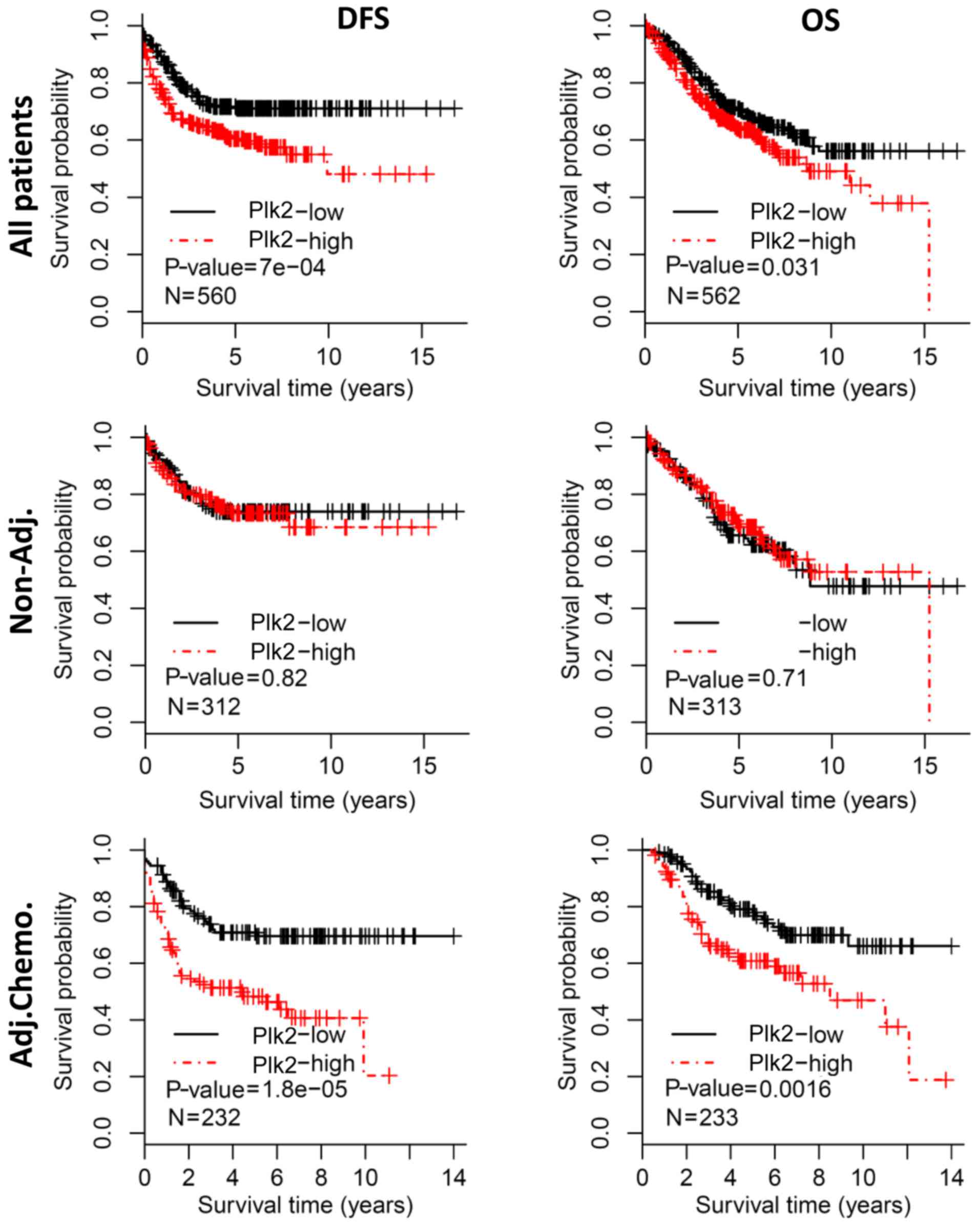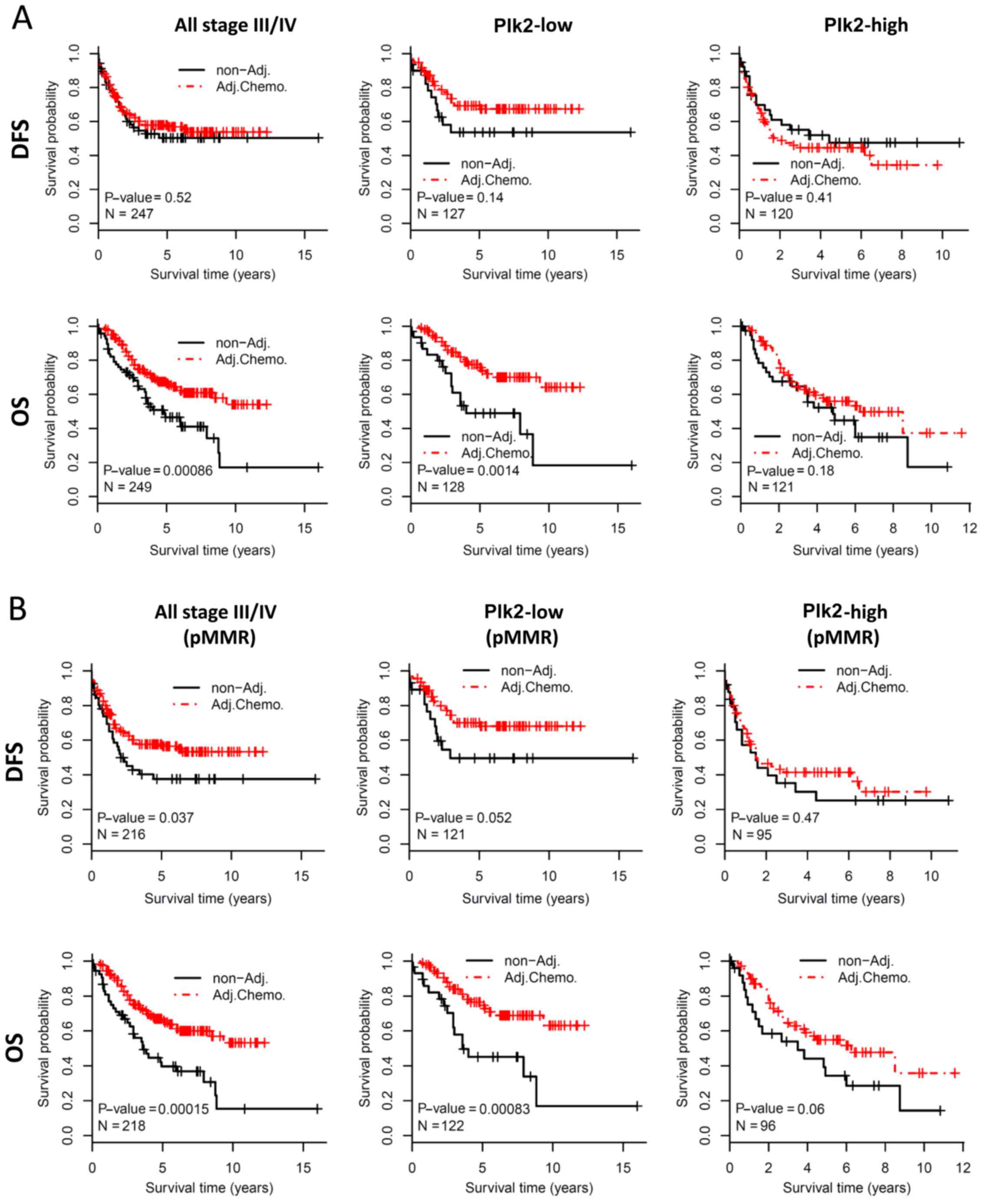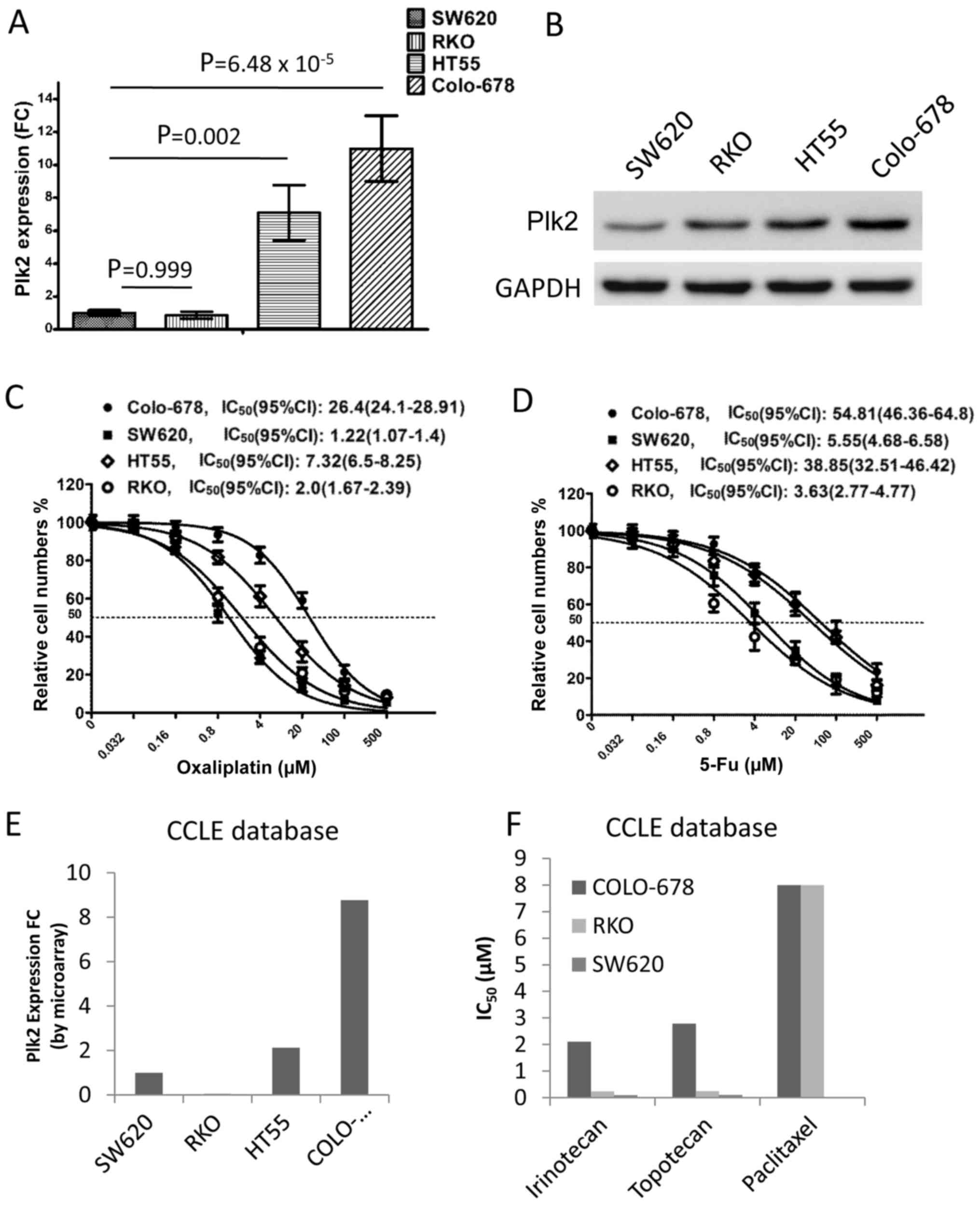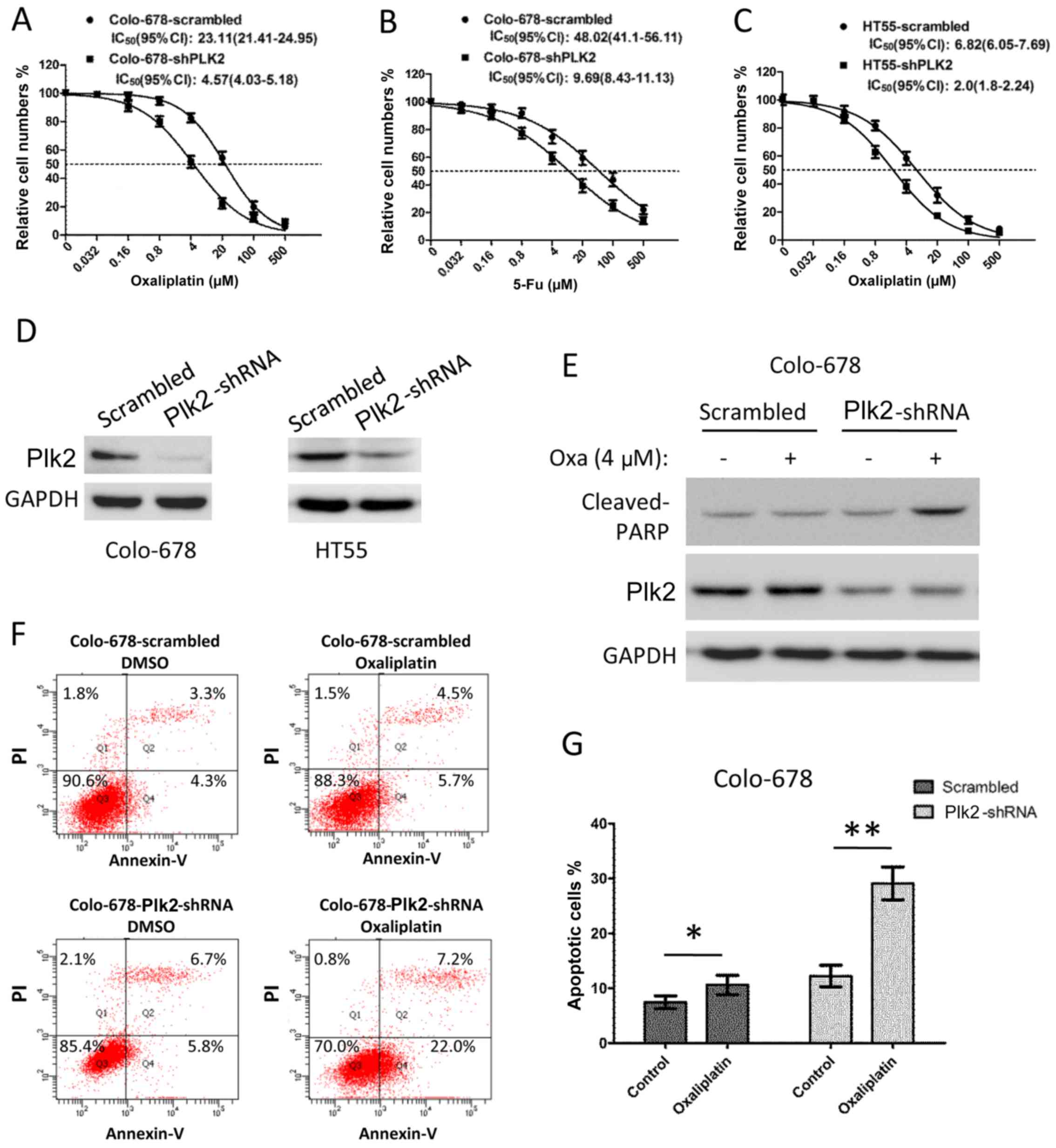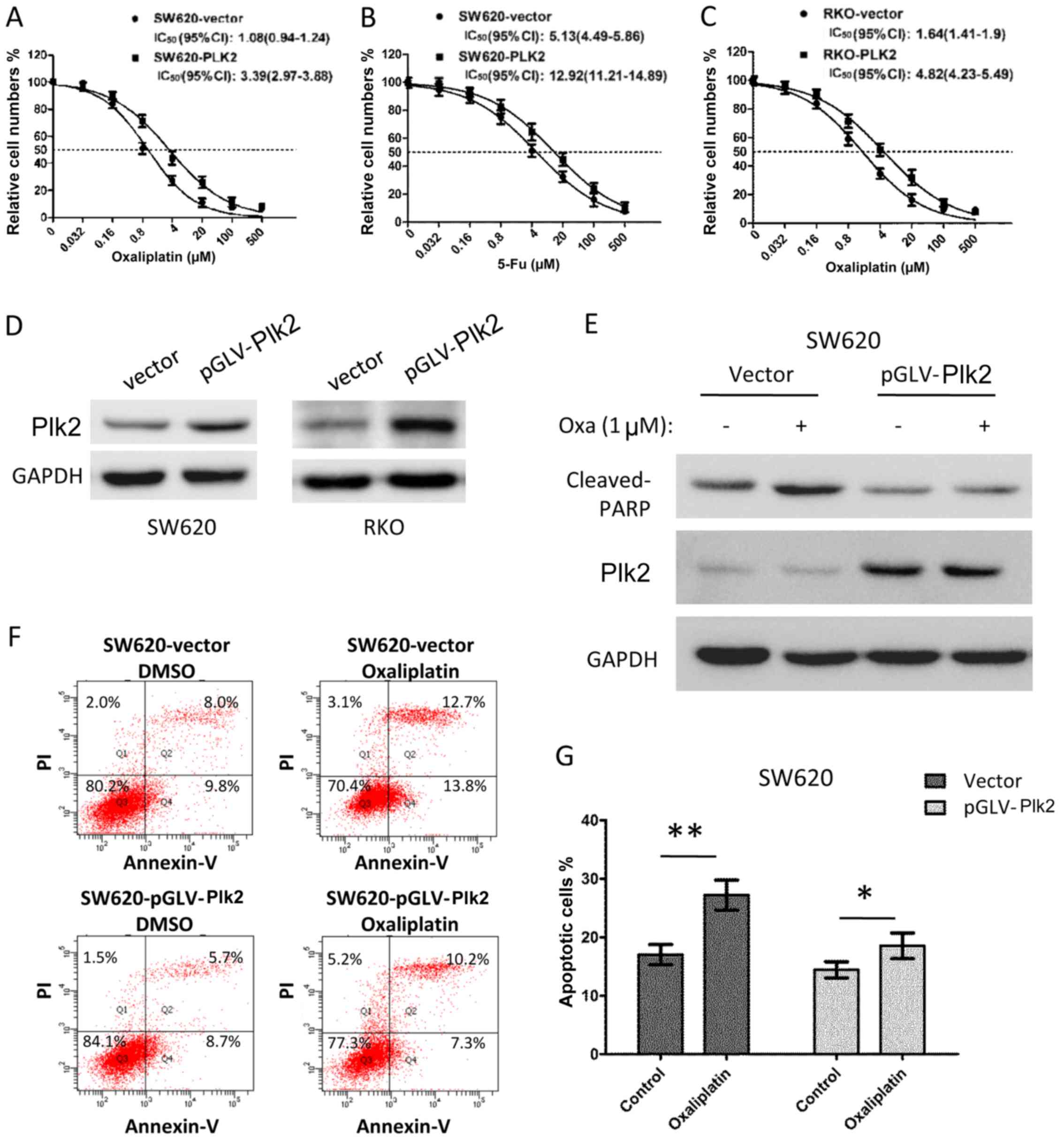|
1
|
Siegel RL, Miller KD and Jemal A: Cancer
Statistics, 2017. CA Cancer J Clin. 67:7–30. 2017. View Article : Google Scholar : PubMed/NCBI
|
|
2
|
Siegel RL, Miller KD, Fedewa SA, Ahnen DJ,
Meester RGS, Barzi A and Jemal A: Colorectal cancer statistics,
2017. CA Cancer J Clin. 67:177–193. 2017. View Article : Google Scholar : PubMed/NCBI
|
|
3
|
André T, Boni C, Mounedji-Boudiaf L,
Navarro M, Tabernero J, Hickish T, Topham C, Zaninelli M, Clingan
P, Bridgewater J, et al Multicenter International Study of
Oxaliplatin/5-Fluorouracil/Leucovorin in the Adjuvant Treatment of
Colon Cancer (MOSAIC) Investigators: Oxaliplatin, fluorouracil, and
leucovorin as adjuvant treatment for colon cancer. N Engl J Med.
350:2343–2351. 2004. View Article : Google Scholar : PubMed/NCBI
|
|
4
|
André T, de Gramont A, Vernerey D,
Chibaudel B, Bonnetain F, Tijeras-Raballand A, Scriva A, Hickish T,
Tabernero J, Van Laethem JL, et al: Adjuvant fluorouracil,
leucovorin, and oxaliplatin in stage II to III colon cancer:
Updated 10-year survival and outcomes according to BRAF mutation
and mismatch repair status of the MOSAIC study. J Clin Oncol.
33:4176–4187. 2015. View Article : Google Scholar
|
|
5
|
Gray R, Barnwell J, McConkey C, Hills RK,
Williams NS and Kerr DJ; Quasar Collaborative Group: Adjuvant
chemotherapy versus observation in patients with colorectal cancer:
A randomised study. Lancet. 370:2020–2029. 2007. View Article : Google Scholar : PubMed/NCBI
|
|
6
|
Cao B, Luo L, Feng L, Ma S, Chen T, Ren Y,
Zha X, Cheng S, Zhang K and Chen C: A network-based predictive
gene-expression signature for adjuvant chemotherapy benefit in
stage II colorectal cancer. BMC Cancer. 17:8442017. View Article : Google Scholar : PubMed/NCBI
|
|
7
|
Sargent DJ, Marsoni S, Monges G, Thibodeau
SN, Labianca R, Hamilton SR, French AJ, Kabat B, Foster NR, Torri
V, et al: Defective mismatch repair as a predictive marker for lack
of efficacy of fluorouracil-based adjuvant therapy in colon cancer.
J Clin Oncol. 28:3219–3226. 2010. View Article : Google Scholar : PubMed/NCBI
|
|
8
|
Ribic CM, Sargent DJ, Moore MJ, Thibodeau
SN, French AJ, Goldberg RM, Hamilton SR, Laurent-Puig P, Gryfe R,
Shepherd LE, et al: Tumor microsatellite-instability status as a
predictor of benefit from fluorouracil-based adjuvant chemo-therapy
for colon cancer. N Engl J Med. 349:247–257. 2003. View Article : Google Scholar
|
|
9
|
Gonsalves WI, Mahoney MR, Sargent DJ,
Nelson GD, Alberts SR, Sinicrope FA, Goldberg RM, Limburg PJ,
Thibodeau SN, Grothey A, et al: Patient and tumor characteristics
and BRAF and KRAS mutations in colon cancer, NCCTG/Alliance N0147.
J Natl Cancer Inst. Jun 12–2014.Epub ahead of print. View Article : Google Scholar : PubMed/NCBI
|
|
10
|
Li W, Qiu T, Zhi W, Shi S, Zou S, Ling Y,
Shan L, Ying J and Lu N: Colorectal carcinomas with KRAS codon 12
mutation are associated with more advanced tumor stages. BMC
Cancer. 15:3402015. View Article : Google Scholar : PubMed/NCBI
|
|
11
|
Hutchins G, Southward K, Handley K, Magill
L, Beaumont C, Stahlschmidt J, Richman S, Chambers P, Seymour M,
Kerr D, et al: Value of mismatch repair, KRAS, and BRAF mutations
in predicting recurrence and benefits from chemotherapy in
colorectal cancer. J Clin Oncol. 29:1261–1270. 2011. View Article : Google Scholar : PubMed/NCBI
|
|
12
|
Sinicrope FA, Mahoney MR, Smyrk TC,
Thibodeau SN, Warren RS, Bertagnolli MM, Nelson GD, Goldberg RM,
Sargent DJ and Alberts SR: Prognostic impact of deficient DNA
mismatch repair in patients with stage III colon cancer from a
randomized trial of FOLFOX-based adjuvant chemotherapy. J Clin
Oncol. 31:3664–3672. 2013. View Article : Google Scholar : PubMed/NCBI
|
|
13
|
Yurgelun MB, Kulke MH, Fuchs CS, Allen BA,
Uno H, Hornick JL, Ukaegbu CI, Brais LK, McNamara PG, Mayer RJ, et
al: Cancer susceptibility gene mutations in individuals with
colorectal cancer. J Clin Oncol. 35:1086–1095. 2017. View Article : Google Scholar : PubMed/NCBI
|
|
14
|
Vakiani E, Janakiraman M, Shen R, Sinha R,
Zeng Z, Shia J, Cercek A, Kemeny N, D'Angelica M, Viale A, et al:
Comparative genomic analysis of primary versus metastatic
colorectal carcinomas. J Clin Oncol. 30:2956–2962. 2012. View Article : Google Scholar : PubMed/NCBI
|
|
15
|
Reinhardt HC and Yaffe MB:
Phospho-Ser/Thr-binding domains: Navigating the cell cycle and DNA
damage response. Nat Rev Mol Cell Biol. 14:563–580. 2013.
View Article : Google Scholar : PubMed/NCBI
|
|
16
|
Takai N, Hamanaka R, Yoshimatsu J and
Miyakawa I: Polo-like kinases (Plks) and cancer. Oncogene.
24:287–291. 2005. View Article : Google Scholar : PubMed/NCBI
|
|
17
|
Syed N, Coley HM, Sehouli J, Koensgen D,
Mustea A, Szlosarek P, McNeish I, Blagden SP, Schmid P, Lovell DP,
et al: Polo-like kinase Plk2 is an epigenetic determinant of
chemosensitivity and clinical outcomes in ovarian cancer. Cancer
Res. 71:3317–3327. 2011. View Article : Google Scholar : PubMed/NCBI
|
|
18
|
Syed N, Smith P, Sullivan A, Spender LC,
Dyer M, Karran L, O'Nions J, Allday M, Hoffmann I, Crawford D, et
al: Transcriptional silencing of Polo-like kinase 2 (SNK/LK2) is a
frequent event in B-cell malignancies. Blood. 107:250–256. 2006.
View Article : Google Scholar
|
|
19
|
Liu F, Zhang S, Zhao Z, Mao X, Huang J, Wu
Z, Zheng L and Wang Q: MicroRNA-27b up-regulated by human
papillomavirus 16 E7 promotes proliferation and suppresses
apoptosis by targeting polo-like kinase2 in cervical cancer.
Oncotarget. 7:19666–19679. 2016.PubMed/NCBI
|
|
20
|
Gee HE, Buffa FM, Harris AL, Toohey JM,
Carroll SL, Cooper CL, Beith J, McNeil C, Carmalt H, Mak C, et al:
MicroRNA-related DNA repair/cell-cycle genes independently
associated with relapse after radiation therapy for early breast
cancer. Int J Radiat Oncol Biol Phys. 93:1104–1114. 2015.
View Article : Google Scholar : PubMed/NCBI
|
|
21
|
Matthew EM, Yen TJ, Dicker DT, Dorsey JF,
Yang W, Navaraj A and El-Deiry WS: Replication stress, defective
S-phase checkpoint and increased death in Plk2-deficient human
cancer cells. Cell Cycle. 6:2571–2578. 2007. View Article : Google Scholar : PubMed/NCBI
|
|
22
|
Hu Z, Xu Z, Liao X, Yang X, Dong C, Luk K,
Jin A and Lu H: Polo-like kinase 2 acting as a promoter in human
tumor cells with an abundance of TAp73. Onco Targets Ther.
8:3475–3488. 2015.PubMed/NCBI
|
|
23
|
Li J, Ma W, Wang PY, Hurley PJ, Bunz F and
Hwang PM: Polo-like kinase 2 activates an antioxidant pathway to
promote the survival of cells with mitochondrial dysfunction. Free
Radic Biol Med. 73:270–277. 2014. View Article : Google Scholar : PubMed/NCBI
|
|
24
|
Ou B, Zhao J, Guan S, Wangpu X, Zhu C,
Zong Y, Ma J, Sun J, Zheng M, Feng H, et al: Plk2 promotes tumor
growth and inhibits apoptosis by targeting Fbxw7/Cyclin E in
colorectal cancer. Cancer Lett. 380:457–466. 2016. View Article : Google Scholar : PubMed/NCBI
|
|
25
|
Marisa L, de Reyniès A, Duval A, Selves J,
Gaub MP, Vescovo L, Etienne-Grimaldi MC, Schiappa R, Guenot D,
Ayadi M, et al: Gene expression classification of colon cancer into
molecular subtypes: Characterization, validation, and prognostic
value. PLoS Med. 10:e10014532013. View Article : Google Scholar : PubMed/NCBI
|
|
26
|
Barretina J, Caponigro G, Stransky N,
Venkatesan K, Margolin AA, Kim S, Wilson CJ, Lehár J, Kryukov GV,
Sonkin D, et al: The cancer cell line encyclopedia enables
predictive modelling of anticancer drug sensitivity. Nature.
483:603–607. 2012. View Article : Google Scholar : PubMed/NCBI
|
|
27
|
Livak KJ and Schmittgen TD: Analysis of
relative gene expression data using real-time quantitative PCR and
the 2(-Delta Delta C(T)) method. Methods. 25:402–408. 2001.
View Article : Google Scholar
|
|
28
|
Wong HL, Lee B, Field K, Lomax A, Tacey M,
Shapiro J, McKendrick J, Zimet A, Yip D, Nott L, et al: Impact of
primary tumor site on bevacizumab efficacy in metastatic colorectal
cancer. Clin Colorectal Cancer. 15:e9–e15. 2016. View Article : Google Scholar : PubMed/NCBI
|
|
29
|
Perron L, Daigle JM, Vandal N, Guertin MH
and Brisson J: Characteristics affecting survival after locally
advanced colorectal cancer in Quebec. Curr Oncol. 22:e485–e492.
2015. View Article : Google Scholar : PubMed/NCBI
|
|
30
|
Li W, Zhi W, Zou S, Qiu T, Ling Y, Shan L,
Shi S and Ying J: Distinct clinicopathological patterns of mismatch
repair status in colorectal cancer stratified by KRAS mutations.
PLoS One. 10:e01282022015. View Article : Google Scholar : PubMed/NCBI
|
|
31
|
Burns TF, Fei P, Scata KA, Dicker DT and
El-Deiry WS: Silencing of the novel p53 target gene Snk/Plk2 leads
to mitotic catastrophe in paclitaxel (taxol)-exposed cells. Mol
Cell Biol. 23:5556–5571. 2003. View Article : Google Scholar : PubMed/NCBI
|
|
32
|
Shimizu-Yoshida Y, Sugiyama K,
Rogounovitch T, Ohtsuru A, Namba H, Saenko V and Yamashita S:
Radiation-inducible hSNK gene is transcriptionally regulated by p53
binding homology element in human thyroid cells. Biochem Biophys
Res Commun. 289:491–498. 2001. View Article : Google Scholar : PubMed/NCBI
|
|
33
|
Yang W, Soares J, Greninger P, Edelman EJ,
Lightfoot H, Forbes S, Bindal N, Beare D, Smith JA, Thompson IR, et
al: Genomics of drug sensitivity in cancer (GDSC): A resource for
therapeutic biomarker discovery in cancer cells. Nucleic Acids Res.
41:D955–D961. 2013. View Article : Google Scholar :
|
|
34
|
Valenti F, Fausti F, Biagioni F, Shay T,
Fontemaggi G, Domany E, Yaffe MB, Strano S, Blandino G and Di
Agostino S: Mutant p53 oncogenic functions are sustained by Plk2
kinase through an autoregulatory feedback loop. Cell Cycle.
10:4330–4340. 2011. View Article : Google Scholar : PubMed/NCBI
|
|
35
|
Dabiri Y, Kalman S, Gürth CM, Kim JY,
Mayer V and Cheng X: The essential role of TAp73 in
bortezomib-induced apoptosis in p53-deficient colorectal cancer
cells. Sci Rep. 7:54232017. View Article : Google Scholar : PubMed/NCBI
|
|
36
|
Herreros-Villanueva M, Muñiz P,
García-Girón C, Cavia-Saiz M and del Corral MJ: TAp73 is one of the
genes responsible for the lack of response to chemotherapy
depending on B-Raf mutational status. J Transl Med. 8:152010.
View Article : Google Scholar : PubMed/NCBI
|
|
37
|
Lorenzi F, Babaei-Jadidi R, Sheard J,
Spencer-Dene B and Nateri AS: Fbxw7-associated drug resistance is
reversed by induction of terminal differentiation in murine
intestinal organoid culture. Mol Ther Methods Clin Dev.
3:160242016. View Article : Google Scholar : PubMed/NCBI
|















